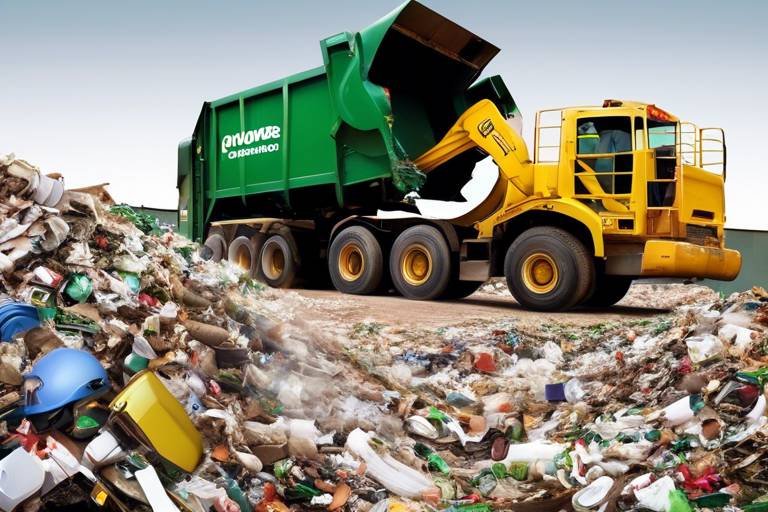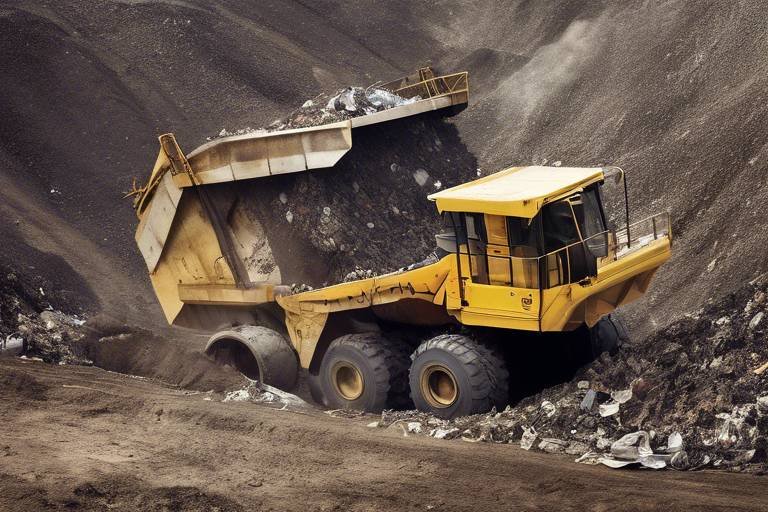Online Trading of Recyclable Materials - A Growing Trend?
The world is witnessing a significant shift in how we perceive and manage recyclable materials. With the rise of technology and the internet, the trading of these materials has transitioned from traditional methods to online platforms, creating a buzz in the sustainability sector. But why is this trend gaining momentum? Well, it’s simple: the convenience, accessibility, and efficiency that online trading offers are reshaping the landscape of recycling. Imagine being able to sell your scrap metal or old electronics from the comfort of your home, or purchasing recyclable materials with just a few clicks. It’s like having a marketplace at your fingertips, where every transaction contributes to a greener planet.
As we dive deeper into this topic, we will explore the various aspects that make online trading of recyclable materials not only a trend but a necessary evolution in our fight against waste and environmental degradation. From the benefits it brings to the challenges it faces, this article aims to provide a comprehensive view of how online trading is revolutionizing the recycling industry. Are you ready to discover how this digital shift is impacting our environment and economy? Let’s embark on this journey together!
Online platforms have revolutionized the way recyclable materials are traded, providing accessibility and convenience for both sellers and buyers. The growth of these platforms is nothing short of remarkable, with many emerging as key players in the recycling industry. Think about it: just a few years ago, if you wanted to sell recyclable materials, you had to rely on local scrap yards or recycling centers. Now, you can connect with buyers from all over the country—or even the world—through a simple app or website. This level of connectivity is **transformative**, making it easier for individuals and businesses to engage in recycling activities.
These platforms are not just about trading; they are about creating a **community** of environmentally conscious individuals and organizations. By facilitating the exchange of materials, they foster a culture of sustainability that extends beyond mere transactions. Users can share tips, discuss best practices, and even collaborate on projects aimed at reducing waste. The significance of these platforms lies in their ability to democratize recycling, making it accessible to everyone, regardless of location or resources.
The benefits of online trading of recyclable materials are numerous and impactful. First and foremost, it leads to increased efficiency. Traditional recycling methods often involve lengthy processes, including transportation to physical locations and dealing with intermediaries. In contrast, online trading streamlines these processes, allowing for quicker transactions and reduced handling times. This efficiency translates into lower costs for both sellers and buyers, making recycling a more attractive option.
Moreover, online trading expands market reach. No longer are sellers confined to their local markets; they can now access a **global audience**. This expanded reach not only increases the chances of finding buyers for specific materials but also encourages competition, which can drive prices up and promote fair trading practices. Enhanced transparency is another significant advantage. Online platforms often provide data on pricing trends and market demands, allowing traders to make informed decisions based on real-time information.
The environmental benefits of online trading are substantial, including reduced landfill waste and lower carbon footprints. By facilitating the recycling process, online trading helps minimize waste generation. For instance, when more people engage in recycling through accessible platforms, the amount of waste that ends up in landfills decreases dramatically. This is crucial, as landfills are a major source of greenhouse gas emissions and environmental pollution.
By facilitating the recycling process, online trading helps minimize waste generation. Strategies such as promoting local trades and encouraging users to share their recycling experiences can significantly impact waste reduction. For example, platforms can implement features that allow users to track their recycling habits and see the positive effects of their contributions. This not only motivates individuals to recycle more but also fosters a sense of community and shared responsibility.
Online trading can significantly decrease transportation emissions associated with recycling. When materials are traded locally, the need for long-distance transportation diminishes, leading to a **smaller carbon footprint**. Traditional recycling often involves transporting materials to centralized facilities, which can be energy-intensive. In contrast, local trades through online platforms promote a more sustainable model by reducing the distance materials travel, thereby lowering emissions and conserving energy.
Despite its benefits, online trading of recyclables faces challenges such as market volatility, regulatory hurdles, and quality control issues. The online market for recyclables can be unpredictable, with prices fluctuating based on demand and supply. This volatility can create uncertainty for traders, making it difficult to establish consistent pricing strategies. Additionally, navigating the complex landscape of regulations surrounding recycling can be daunting for new entrants in the market.
Navigating regulations is crucial for successful online trading of recyclable materials. Understanding and adhering to environmental laws is essential for online traders. Compliance not only ensures the legality of transactions but also promotes sustainable practices within the industry. Non-adherence can lead to severe consequences, including fines and damage to reputation.
Understanding and adhering to environmental regulations is essential for online traders. This compliance is not just a legal obligation; it is a commitment to sustainability and responsible trading practices. Traders must stay informed about local, national, and international regulations that govern the recycling industry to avoid legal pitfalls.
The online market for recyclables can be unpredictable, with prices fluctuating based on demand and supply. Factors such as seasonal changes, economic conditions, and global market trends can all influence pricing. Traders must be prepared to adapt to these changes and develop strategies to mitigate risks associated with market volatility.
- What are the main benefits of online trading of recyclable materials?
Online trading offers increased efficiency, expanded market reach, and enhanced transparency, contributing to a more sustainable economy. - How does online trading impact the environment?
It reduces landfill waste and lowers carbon footprints by facilitating local trades and minimizing transportation emissions. - What challenges do online traders face?
Challenges include market volatility, regulatory hurdles, and quality control issues. - How can I ensure compliance with environmental laws while trading online?
Stay informed about relevant regulations and incorporate best practices to ensure legal and sustainable trading.

The Rise of Online Platforms
In recent years, the landscape of trading recyclable materials has undergone a dramatic transformation, largely driven by the advent of online platforms. These digital marketplaces have not only made trading more accessible but have also enhanced the overall efficiency of the process. Imagine a world where you can easily connect with local buyers and sellers of recyclable materials, all from the comfort of your home. That's the reality today! As more people become aware of the importance of recycling and sustainability, the demand for these platforms continues to grow.
Online platforms have revolutionized the way we think about recycling. Traditionally, individuals and businesses faced numerous hurdles when trying to dispose of recyclable materials. From finding a local recycling center to understanding the types of materials accepted, the process was often cumbersome. However, with the rise of online trading, these barriers are being dismantled. Now, users can simply log onto a website or an app, list their recyclable items, and connect with potential buyers within minutes. This convenience is a game-changer, making it easier than ever to participate in sustainable practices.
Moreover, these platforms facilitate a more extensive market reach. Local sellers can now connect with buyers beyond their immediate vicinity. For instance, a small business in a rural area can sell its recyclable materials to larger companies in urban centers, thus maximizing its profit potential. This expanded reach not only benefits sellers but also helps buyers find the materials they need without the hassle of searching in multiple locations.
Another significant advantage of online trading is the enhanced transparency it offers. Users can easily compare prices, check ratings, and read reviews about buyers and sellers. This level of transparency fosters trust within the community, encouraging more individuals and businesses to engage in recycling activities. As a result, the online trading of recyclables is not just a trend—it's becoming a fundamental part of how we approach sustainability.
In summary, the rise of online platforms for trading recyclable materials marks a significant shift in how we interact with waste and recycling. These platforms provide a seamless and efficient way to connect, trade, and promote sustainability. As we continue to embrace technology, we can expect even more innovations that will further enhance our ability to recycle and reduce waste effectively.

Benefits of Online Trading
Online trading of recyclable materials is not just a passing trend; it’s a revolution that’s transforming the recycling landscape. Imagine being able to connect with buyers and sellers from all over the world, all from the comfort of your home. This accessibility is one of the most significant benefits of online trading. With just a few clicks, sellers can list their recyclable materials, and buyers can browse a vast array of options. This convenience opens up new opportunities for individuals and businesses alike, making it easier than ever to participate in the recycling economy.
Moreover, online trading platforms enhance efficiency in the recycling process. Traditional methods often involve intermediaries, which can slow down the transaction and inflate costs. However, digital platforms streamline these operations, allowing for quicker exchanges and reducing the time it takes to get materials to their next destination. This increased efficiency not only benefits the traders but also contributes to a more sustainable economy by ensuring that recyclable materials are processed and reused swiftly.
Another major advantage of online trading is the expanded market reach. Sellers can now access a global marketplace, allowing them to find the best prices for their materials. This is especially important for less common recyclables that might not have a strong local market. For instance, a seller in a small town can connect with buyers in urban areas or even international markets, maximizing their profit potential. This kind of access was virtually impossible before the rise of online trading platforms.
Transparency is yet another benefit that cannot be overlooked. Online trading platforms often provide detailed information about pricing trends, buyer and seller ratings, and transaction histories. This transparency builds trust among users, which is crucial in an industry where quality and reliability are paramount. When both parties can see the history of transactions, it fosters a sense of security and encourages more people to engage in the trading process.
To sum it up, the benefits of online trading of recyclable materials are multi-faceted and contribute significantly to a sustainable economy. Here’s a quick recap of the key advantages:
- Accessibility: Connect with buyers and sellers globally.
- Efficiency: Streamlined transactions reduce time and costs.
- Market Reach: Access to broader markets increases profit potential.
- Transparency: Detailed information builds trust and encourages participation.
As we continue to embrace digital solutions, the recycling industry stands to gain tremendously from these advancements. The shift towards online trading not only enhances the operational aspects of recycling but also contributes to a cleaner, more sustainable planet. Isn’t it exciting to think about how technology can help us reduce waste and promote recycling in ways we never imagined?

Environmental Impact
The environmental impact of online trading of recyclable materials is nothing short of remarkable. In a world where waste management is becoming increasingly critical, these digital platforms are stepping up to the plate, acting as catalysts for significant change. By facilitating the exchange of recyclable materials, online trading not only promotes recycling but also plays a vital role in reducing landfill waste and lowering carbon footprints. It's like having a powerful tool in our hands that can help us reshape our relationship with waste.
To understand the depth of this impact, let's consider a few key areas where online trading makes a difference:
- Reduced Landfill Waste: Traditional waste disposal methods often lead to overflowing landfills, which can take decades, if not centuries, to decompose. Online trading encourages consumers and businesses to recycle more, ultimately diverting waste from landfills. This shift is crucial, especially when we consider that landfills are a significant source of greenhouse gas emissions.
- Lower Carbon Footprints: The transportation of recyclable materials has a hefty carbon cost. By enabling local trades, online platforms significantly reduce the distance materials need to travel. Imagine cutting down on your car's fuel consumption by simply trading locally instead of shipping materials across the country. This localized approach not only saves energy but also minimizes the overall carbon emissions associated with recycling.
- Enhanced Resource Efficiency: Online trading platforms allow for a more efficient allocation of resources. By connecting sellers and buyers directly, these platforms ensure that recyclable materials are utilized effectively, reducing the need for virgin materials. This circular economy approach means that we can make the most out of what we already have, thereby conserving our planet's precious resources.
Moreover, the integration of technology in recycling processes has led to innovative solutions that further bolster environmental sustainability. For instance, many online platforms now use data analytics to match supply with demand efficiently. This means that recyclables are not just traded, but they are traded smartly, ensuring that the right materials are processed at the right time.
In summary, the environmental impact of online trading of recyclable materials is profound and multifaceted. By reducing landfill waste, lowering carbon footprints, and enhancing resource efficiency, these platforms are paving the way for a more sustainable future. It's a win-win situation where both the environment and the economy can thrive. As we continue to embrace these digital solutions, we move closer to a world where waste is no longer seen as a burden but as a valuable resource waiting to be reclaimed.

Reducing Waste
In the age of rampant consumerism and waste generation, finding effective ways to reduce waste has become more crucial than ever. Online trading platforms for recyclable materials serve as a beacon of hope in this battle against waste. By connecting sellers of recyclable materials directly with buyers, these platforms streamline the recycling process, making it easier and more efficient. Imagine a bustling marketplace where plastic bottles, aluminum cans, and scrap metal find new homes instead of languishing in landfills. This is the reality that online trading creates.
The beauty of online trading lies in its ability to facilitate the recycling process by providing an accessible marketplace for various materials. Sellers can list their recyclables with just a few clicks, and buyers can easily find the materials they need. This not only encourages individuals and businesses to recycle more but also fosters a community dedicated to sustainability. By engaging in online trading, participants actively contribute to waste reduction and promote a circular economy, where resources are reused rather than discarded.
Moreover, online trading platforms often come equipped with features that enhance the recycling experience. For instance, many platforms provide educational resources on how to prepare materials for recycling, which can significantly impact the efficiency of the process. Understanding how to clean and sort recyclables can lead to higher quality materials entering the recycling stream, ultimately resulting in less waste. By empowering users with knowledge and tools, these platforms make it easier than ever to participate in waste reduction efforts.
Additionally, the convenience of online trading reduces the barriers that often prevent people from recycling. Traditional recycling methods can be cumbersome, involving trips to recycling centers or complicated sorting processes. With online trading, individuals can sell or donate their recyclables from the comfort of their homes. This ease of access encourages more people to engage in recycling, leading to a significant decrease in overall waste generation.
To further illustrate the impact of online trading on waste reduction, consider the following key points:
- Increased Participation: Online platforms attract a wider audience, encouraging more individuals and businesses to recycle.
- Streamlined Processes: By simplifying the logistics of recycling, online trading minimizes the time and effort required to recycle.
- Community Engagement: These platforms create a sense of community among recyclers, fostering collaboration and shared goals.
Ultimately, the role of online trading in reducing waste cannot be overstated. It serves as a catalyst for change, encouraging sustainable practices and making recycling accessible to everyone. By harnessing technology and community engagement, we can transform our approach to waste management and work towards a cleaner, greener future.

Lowering Carbon Footprint
In an age where climate change looms large over our collective consciousness, the importance of reducing our carbon footprint cannot be overstated. One of the most significant ways that online trading of recyclable materials contributes to this goal is through the reduction of transportation emissions. Imagine a world where the materials you recycle are not only processed efficiently but are also kept within your local community. This is precisely what online platforms facilitate. By connecting local sellers and buyers, these platforms minimize the distance that recyclable materials travel, thereby drastically reducing the emissions associated with transportation.
Consider this: traditional recycling often involves transporting materials over long distances to processing facilities, which can lead to increased fuel consumption and greenhouse gas emissions. In contrast, online trading allows for a more localized approach. When recyclables are traded within a community, the need for long-haul trucking diminishes significantly. This not only cuts down on fossil fuel use but also contributes to cleaner air and a healthier environment. It’s like swapping a long road trip for a quick bike ride to your neighbor's house—much more efficient and eco-friendly!
Furthermore, the online trading ecosystem encourages businesses and individuals to engage in practices that prioritize sustainability. Many companies are now integrating sustainability into their business models, and they recognize that sourcing recyclable materials locally can enhance their green credentials. This shift not only helps reduce carbon emissions but also fosters a culture of environmental responsibility within communities. The more we engage in local trading, the more we can collectively lower our carbon footprint.
To illustrate the impact of online trading on carbon emissions, let's take a look at a simplified comparison:
| Method | Average Distance Traveled (miles) | Estimated CO2 Emissions (per ton) |
|---|---|---|
| Traditional Recycling | 100 | 1,200 lbs |
| Online Local Trading | 20 | 240 lbs |
As shown in the table, the **carbon emissions** associated with local online trading are significantly lower than those of traditional recycling methods. This stark contrast highlights the potential of online trading platforms to not only streamline the recycling process but also to play a crucial role in combating climate change.
In conclusion, the online trading of recyclable materials is more than just a trend; it is a powerful tool for reducing our carbon footprint. By fostering local connections and encouraging sustainable practices, these platforms not only make recycling more efficient but also contribute to a healthier planet. So next time you think about recycling, consider how online trading can make a difference—not just for you, but for the environment as a whole.

Challenges in Online Trading
While the online trading of recyclable materials brings a plethora of advantages, it is not without its challenges. Navigating the complexities of this digital marketplace can feel like trying to find your way through a dense forest without a map. One of the primary hurdles is market volatility. Prices for recyclable materials can fluctuate wildly, often dictated by global demand and supply dynamics. For instance, when demand for recycled plastics spikes, prices can soar, but they can just as quickly plummet when demand wanes. This unpredictability can create a precarious environment for traders who rely on stable pricing to sustain their businesses.
Another significant challenge is the regulatory landscape surrounding the trading of recyclables. Each country, and often individual states or regions, has its own set of laws governing waste management and recycling practices. Traders must be well-versed in these regulations to avoid penalties and ensure compliance. Failing to adhere to environmental laws can result in hefty fines and damage to a trader's reputation, which can be detrimental in the long run. The need for constant vigilance and adaptation to changing regulations can be a daunting task for many involved in online trading.
Quality control also poses a considerable challenge in the online trading arena. Unlike traditional recycling methods where materials are often processed in controlled environments, online trading can lead to inconsistencies in the quality of recyclable materials being exchanged. Buyers may receive materials that do not meet their expectations, leading to disputes and potential financial losses. Establishing trust and ensuring quality assurance is critical in this market. Many platforms are now implementing rating systems or requiring certifications to help mitigate these risks, but the effectiveness of these measures can vary widely.
Moreover, the digital divide can limit participation in online trading. Not everyone has equal access to the internet or the necessary technology to engage in these platforms. This disparity can create an uneven playing field, where only those with sufficient resources can fully benefit from online trading opportunities. As such, it is essential for stakeholders to work towards inclusivity and accessibility to ensure that the benefits of online trading can be enjoyed by all.
In summary, while the online trading of recyclable materials presents exciting opportunities for sustainability and economic growth, it is accompanied by significant challenges. Market volatility, regulatory compliance, quality control issues, and the digital divide are all factors that stakeholders must navigate carefully. Addressing these challenges requires collaboration, innovation, and a commitment to creating a more resilient and sustainable trading environment.
- What are the main benefits of online trading for recyclables? Online trading increases efficiency, expands market reach, and enhances transparency, contributing to a more sustainable economy.
- How does online trading impact the environment? It helps reduce landfill waste and lowers carbon footprints by promoting local trades and recycling efforts.
- What are the regulatory challenges in online trading? Traders must navigate a complex landscape of environmental laws that vary by region, which can affect their operations.
- How can quality control be ensured in online trading? Many platforms are implementing rating systems and requiring certifications to help maintain quality standards.

Regulatory Considerations
When it comes to the online trading of recyclable materials, navigating the regulatory landscape can feel like trying to find your way through a dense forest without a map. The legal frameworks governing these transactions are crucial for ensuring that the trading process is not only efficient but also compliant with environmental standards. As the market grows, so too does the complexity of the rules that govern it. Understanding these regulations is essential for anyone looking to participate in this burgeoning industry.
One of the primary concerns for online traders is compliance with environmental laws. These laws are designed to protect our planet by regulating how materials are collected, processed, and recycled. For instance, many regions have specific requirements regarding the types of materials that can be traded, the methods used for processing them, and the documentation needed to ensure that all transactions are legitimate. Failure to adhere to these regulations can result in hefty fines and legal repercussions, which can be detrimental to a trader's business. Thus, it is imperative for traders to stay informed about the regulations that apply to their specific region.
Moreover, the regulatory environment is not static; it evolves in response to new environmental challenges and technological advancements. This means that traders must be proactive in keeping up with changes in legislation. For example, recent initiatives aimed at reducing plastic waste have led to stricter regulations on the trading of certain plastic materials. Traders who are not aware of these changes may find themselves at a disadvantage, facing penalties or losing out on lucrative opportunities.
Another important aspect of regulatory considerations is the impact of market volatility on pricing. The online market for recyclables can be unpredictable, with prices fluctuating based on demand and supply. Regulatory changes can further exacerbate this volatility, as new rules may either restrict or encourage trading activities. For instance, if a government introduces subsidies for recycling certain materials, demand may surge, leading to higher prices. Conversely, if new regulations impose strict limits on the types of materials that can be traded, prices may drop as supply decreases. Understanding these dynamics is vital for traders to make informed decisions and strategize effectively.
In summary, the regulatory considerations surrounding online trading of recyclable materials are multifaceted and require careful attention. Compliance with environmental laws, keeping abreast of regulatory changes, and understanding market volatility are all essential components that traders must navigate to succeed in this evolving landscape. By doing so, they not only protect their business interests but also contribute to a more sustainable future.
- What are the key regulations affecting online trading of recyclables?
Key regulations typically include environmental protection laws, waste management regulations, and local trading ordinances that dictate what materials can be traded and how. - How can I ensure compliance with environmental laws?
Staying informed about local regulations, obtaining necessary permits, and maintaining accurate documentation of all transactions are essential steps for compliance. - What should I do if regulations change?
Regularly review the regulations that apply to your trading activities and consult with legal experts if necessary to adapt your business practices accordingly. - How does market volatility affect pricing in recyclable materials?
Market volatility can lead to fluctuating prices based on supply and demand changes. Regulatory shifts can also impact this by either increasing or decreasing market activity.

Compliance with Environmental Laws
When diving into the world of online trading for recyclable materials, one cannot overlook the importance of . These regulations are not just bureaucratic red tape; they are essential for ensuring that the trading process is not only efficient but also sustainable and eco-friendly. Every online trader must navigate a complex landscape of local, national, and sometimes international regulations that aim to protect our environment. Ignoring these laws can lead to severe consequences, including hefty fines and legal repercussions, which can ultimately derail a business.
Understanding the legal frameworks governing recyclable materials is crucial. For instance, many countries have specific regulations that dictate how recyclables can be collected, processed, and sold. These laws are designed to minimize environmental impact and promote responsible trading practices. Compliance not only protects the environment but also builds trust with customers and stakeholders. Imagine walking into a store where you know every product is sourced sustainably; that’s the kind of confidence compliance can inspire.
Moreover, the compliance landscape is continually evolving. New laws and regulations are being introduced in response to emerging environmental challenges. For example, some regions are implementing stricter guidelines on the types of materials that can be recycled and the processes that must be followed. This means that online traders need to stay informed and adaptable. Here’s a quick overview of key compliance areas:
- Waste Management Regulations: Traders must adhere to local waste management laws that dictate how recyclable materials should be handled.
- Environmental Impact Assessments: Some jurisdictions require assessments to evaluate the potential environmental impact of recycling operations.
- Reporting and Documentation: Traders are often required to keep detailed records of transactions and recycling processes to ensure transparency.
Failing to comply with these regulations can lead to significant setbacks. Not only can it result in financial penalties, but it can also tarnish a company’s reputation. In the digital age, where information spreads like wildfire, a single misstep can lead to public backlash. Therefore, maintaining compliance is not just about avoiding penalties; it’s about fostering a culture of responsibility and sustainability.
In conclusion, compliance with environmental laws is a fundamental aspect of online trading in recyclable materials. It ensures that the trading process contributes positively to the environment and society. As the industry continues to grow, staying informed and compliant will be key to success. Traders who prioritize these regulations will not only thrive but also play a crucial role in promoting sustainability in our communities.
- What are the main environmental laws affecting online trading of recyclables?
These laws typically include regulations on waste management, recycling processes, and reporting requirements. - How can I ensure compliance with environmental regulations?
Stay informed about local laws, maintain accurate records, and consider consulting with legal experts in environmental law. - What are the consequences of non-compliance?
Consequences can include fines, legal action, and damage to your business's reputation. - Can compliance improve my business's reputation?
Absolutely! Demonstrating a commitment to sustainability can enhance customer trust and attract environmentally-conscious consumers.

Market Volatility and Pricing
The landscape of online trading for recyclable materials is as dynamic as the materials themselves, with market volatility being a significant factor that traders must navigate. Prices for recyclables can fluctuate dramatically, influenced by a variety of factors that are often beyond the control of individual traders. For instance, the demand for specific materials like plastics, metals, or paper can surge or plummet based on global economic conditions, technological advancements, and even seasonal trends. This unpredictability can create a rollercoaster effect, making it essential for traders to stay informed and agile.
One of the primary drivers of market volatility is the supply and demand equation. When demand for a particular recyclable material rises, prices tend to increase correspondingly. Conversely, if there’s an oversupply—perhaps due to a lack of processing capacity or a sudden drop in demand—prices can drop significantly. This situation not only affects individual traders but can also ripple through the entire market, impacting recycling facilities and even manufacturers who rely on these materials for production.
Another contributing factor to this volatility is the global market dynamics. For example, fluctuations in oil prices can affect the cost of producing new plastics, which in turn influences the demand for recycled plastics. Additionally, international trade policies and tariffs can create further uncertainty, as changes in regulations can either open up or restrict markets for recyclables. Traders must constantly monitor these external factors to make informed decisions about when to buy or sell their materials.
To better understand the complexity of pricing in the online recycling market, consider the following table that outlines the average price range for some common recyclable materials:
| Material | Average Price per Ton (USD) | Factors Influencing Price |
|---|---|---|
| Aluminum | $1,800 - $2,200 | Global demand, production rates |
| Cardboard | $100 - $150 | Seasonal demand, recycling capacity |
| HDPE Plastic | $500 - $700 | Oil prices, production costs |
| PET Plastic | $300 - $500 | Market competition, consumer trends |
Given these fluctuations, traders need to develop effective strategies to mitigate risks associated with market volatility. One approach is to establish long-term relationships with buyers and sellers, which can provide more stability in pricing. Additionally, utilizing data analytics can help traders anticipate market trends and make more informed decisions. By understanding the underlying factors that contribute to market changes, traders can position themselves to take advantage of favorable conditions while minimizing potential losses.
In conclusion, while market volatility presents challenges for those involved in online trading of recyclable materials, it also offers opportunities for savvy traders who can adapt to changing conditions. By staying informed about market trends and developing strategic relationships, traders can navigate the ups and downs of pricing and contribute to a more sustainable recycling economy.
- What causes fluctuations in recyclable material prices? Prices can fluctuate due to changes in supply and demand, global market trends, and external factors like oil prices and trade policies.
- How can traders mitigate risks associated with market volatility? Establishing long-term relationships with buyers and sellers, and utilizing data analytics can help traders make informed decisions.
- What are some common recyclable materials traded online? Common materials include aluminum, cardboard, HDPE plastic, and PET plastic.
- Why is it important to stay informed about market trends? Staying informed allows traders to anticipate changes and adjust their strategies accordingly, which can lead to better pricing and reduced losses.
Frequently Asked Questions
- What is online trading of recyclable materials?
Online trading of recyclable materials refers to the process of buying and selling recyclable items through digital platforms. This method offers a convenient way for individuals and businesses to connect, facilitating the exchange of materials like paper, plastics, metals, and more.
- How do online platforms benefit the recycling industry?
Online platforms enhance the recycling industry by increasing efficiency, expanding market reach, and providing greater transparency. They allow sellers to access a larger audience, while buyers can find specific materials easily, streamlining the entire recycling process.
- What are the environmental impacts of online trading?
Online trading significantly reduces landfill waste and lowers carbon footprints. By connecting local sellers and buyers, it minimizes transportation emissions and encourages recycling practices that contribute to environmental sustainability.
- What challenges does online trading face?
Some challenges include market volatility, regulatory hurdles, and quality control issues. Prices can fluctuate based on supply and demand, and traders must navigate various regulations to ensure compliance while maintaining product quality.
- How can I ensure compliance with environmental laws when trading online?
To ensure compliance, it's essential to understand the local and national regulations governing recyclable materials. Staying informed about environmental laws and seeking legal advice when necessary can help traders navigate these complex requirements.
- What factors contribute to market volatility in the recycling sector?
Market volatility in the recycling sector can be influenced by several factors, including changes in demand for materials, fluctuations in global commodity prices, and shifts in consumer behavior. These elements can lead to unpredictable pricing and affect trading stability.



















